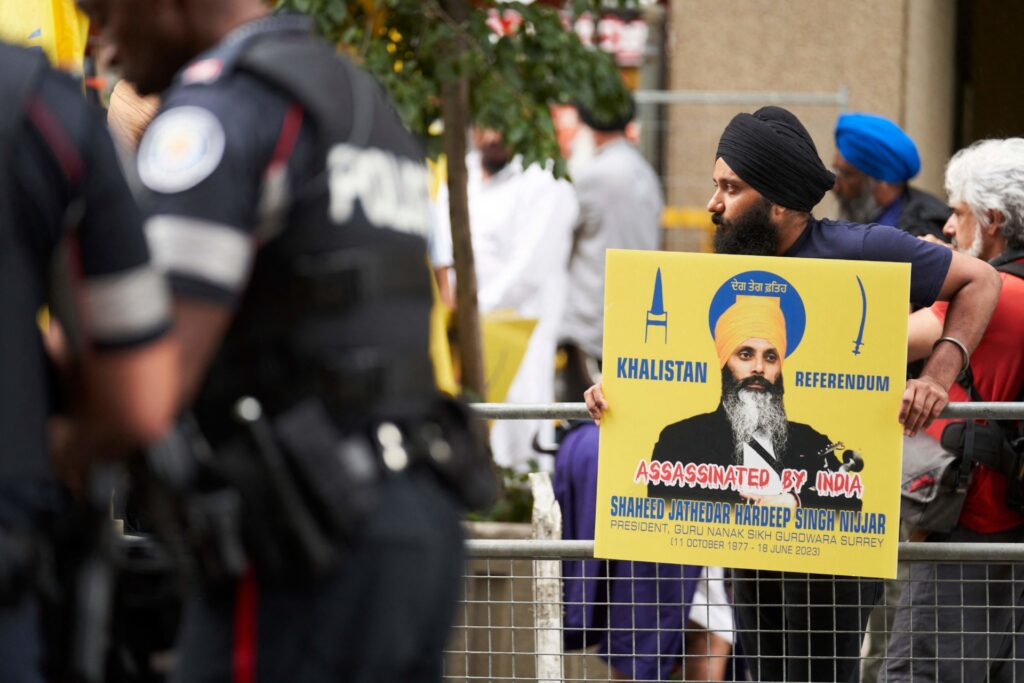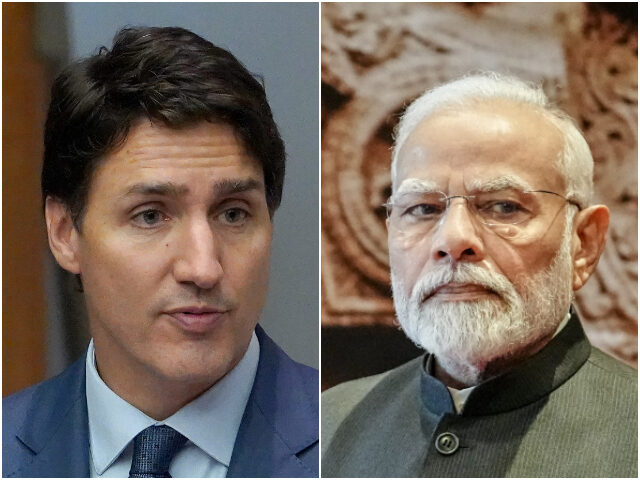Canadian Prime Minister Justin Trudeau on Monday accused the Indian government of murdering Sikh leader Hardeep Singh Nijjar on Canadian soil in June.
Canada quickly announced the expulsion of a senior Indian diplomat as a punitive measure. India denounced Trudeau’s charges as “absurd” and expelled a senior Canadian diplomat in response.
“Canadian security agencies have been actively pursuing credible allegations of a potential link between agents of the Government of India and the killing of a Canadian citizen, Hardeep Singh Nijjar,” Trudeau said in an emergency statement to the House of Commons on Monday.
“Any involvement of a foreign government in the killing of a Canadian citizen on Canadian soil is an unacceptable violation of our sovereignty. It is contrary to the fundamental rules by which free, open and democratic societies conduct themselves,” he declared.
Trudeau urged Indian Prime Minister Narendra Modi and his government to “cooperate with Canada to get to the bottom of this matter.”
“Canada has declared its deep concerns to the top intelligence and security officials of the Indian government. Last week at the G20 I brought them personally and directly to Prime Minister Modi in no uncertain terms,” he said.
Trudeau had an uncomfortable encounter with Modi on the sidelines of the G20 summit in New Delhi, India, last Sunday. Modi scolded Trudeau for allowing Sikh separatist groups – like the one Nijjar was involved with – to hold fiery demonstrations on Canadian soil. Modi told Trudeau that such groups have been responsible for “inciting violence against Indian diplomats, damaging diplomatic premises, and threatening the Indian community in Canada and their places of worship.”
Trudeau responded by defending Canada’s commitment to free speech. He sought a fuller bilateral meeting with Modi at the summit, but Modi’s office refused his request. Other members of Modi’s administration blasted Trudeau and his Liberal Party for pandering to Sikh extremists in Canada for votes. Trudeau wound up stranded in New Delhi for two extra days due to a malfunction with his plane and refused India’s offer of a ride home.
As tense and awkward as the G20 summit was for Trudeau, there was no indication at the time that he directly accused Modi’s government of involvement in Nijjar’s murder.

Sikhs protest for the independence of Khalistan in front of the Indian Consulate in Toronto, Canada, on July 8, 2023. (GEOFF ROBINS/AFP via Getty)
Trudeau said on Monday his administration has been “working closely and coordinating with our allies on this very serious matter.” A senior Canadian government source told CBC News that Trudeau has briefed U.S. President Joe Biden, U.K. Prime Minister Rishi Sunak, and French President Emmanuel Macron, among others, on the case.
“We are deeply concerned about the allegations referenced by Prime Minister Trudeau earlier today,” White House National Security Council spokeswoman Adrienne Watson said in a statement issued late Monday night.
“We remain in regular contact with our Canadian partners. It is critical that Canada’s investigation proceed and the perpetrators be brought to justice,” Watson said.
The British government said it was in contact with Canada about the “serious allegations” brought by Trudeau. The office of Australian Foreign Minister Penny Wong also said her government was “deeply concerned” about the allegations.
The Indian Foreign Ministry immediately condemned Trudeau’s remarks to the House of Commons as “absurd.”
“Such unsubstantiated allegations seek to shift the focus from Khalistani terrorists and extremists, who have been provided shelter in Canada and continue to threaten India’s sovereignty and territorial integrity,” the Foreign Ministry said.
“The inaction of the Canadian Government on this matter has been a long-standing and continuing concern. That Canadian political figures have openly expressed sympathy for such elements remains a matter of deep concern,” the statement added, alluding to the complaints Modi lodged with Trudeau at the G20 summit.
“We are a democratic polity with a strong commitment to rule of law,” the Indian Foreign Ministry insisted.
Shortly after Trudeau made his statement, Canadian Foreign Minister Melanie Joly said she ordered the expulsion of a “senior Indian diplomat.”
“My expectations are clear. I expect India to fully collaborate with us and get to the bottom of this,” Joly said.
The Canadian Foreign Ministry swiftly leaked the identity of the expelled diplomat to the media: Pavan Kumar Raj, the head of India’s Research and Analysis Wing (RAW) office in Canada. RAW is the Indian foreign intelligence agency.
The Times of India (TOI) noted that leaking Raj’s identity in this manner was a major “breach of protocol” between allied nations, who typically do not “identify by name the station chief of spy agencies.”
On Tuesday, India expelled an unnamed senior Canadian diplomat in retaliation. Canada’s ambassador, Cameron MacKay, was summoned to New Delhi to inform him of the expulsion.
“The concerned diplomat has been asked to leave India within the next five days. The decision reflects the Government of India’s growing concern at the interference of Canadian diplomats in our internal matters and their involvement in anti-India activities,” the Indian Foreign Ministry said on Tuesday.
“We urge the government of Canada to take prompt and effective legal action against all anti-India elements operating from their soil,” the Foreign Ministry said.
Nijjar, 45 at the time of his death, was gunned down while sitting in his truck outside a Sikh temple in Surrey, British Columbia, on June 18.
Nijjar was the president of the temple, and a prominent activist in the Khalistan movement, which calls for an autonomous Sikh nation to be carved from the Indian state of Punjab. The Indian government regards the Khalistanis as an extremist movement with a propensity for violence and it has accused Nijjar of belonging to a terrorist cell called the Khalistan Tiger Force, linking him to a 2007 bombing in New Delhi.
Nijjar denied these allegations, at one point writing a letter to Trudeau asking him to “dispel the Indian government’s fabricated, baseless, fictitious, and politically motivated allegations against me.”
According to his lawyer, Nijjar was warned by the Canadian Security Intelligence Service (CSIS) that his life was in danger, ostensibly because he supported a non-binding referendum among Canadian Sikhs to support Khalistan.
Eyewitnesses described Nijjar’s two suspected killers as “heavier-set males, wearing face coverings.” Police later said a third suspect might have been involved, and asked the public for help in locating the vehicle they reported escaped in, a silver 2008 Toyota Camry.
No arrests have been made in the case to date, but many members of the large Sikh community in Canada immediately believed a foreign power was behind Nijjar’s death.
“We understand there is a lot of speculation regarding the motive of this homicide, but we are dedicated to learning the facts and letting the evidence lead our investigation,” Canada’s Integrated Homicide Investigation Team (IHIT) said shortly after the killing, acknowledging the rumors.
The Royal Canadian Mounted Police (RCMP) said on Monday their investigation of Nijjar’s murder is “progressing.”
“We’ll hold the perpetrators accountable and bring them to justice,” Public Safety Minister Dominic LeBlanc vowed.
Sikh groups in Canada applauded Trudeau for confronting India, as reported by the BBC:
After Mr Trudeau’s comments, several large posters and tributes to Mr Nijjar were visible at the Guru Nanak Sikh Gurdwara in Surrey.
Moninder Singh, a spokesman for the British Columbia Sikhs Gurdwaras Council, told the BBC that the community appreciated “that at least the prime minister stood up and acknowledged that there is a foreign hand behind this murder”.
Other Sikh groups in Canada, including the World Sikh Organization, welcomed the prime minister’s statement, saying Mr Trudeau confirmed what was already widely believed in the community.
“India cannot be allowed to disregard the rule of law and the sovereignty of foreign states. The killing of Hardeep Singh Nijjar and other Sikh activists were terrorist acts that must be condemned by the international community,” World Sikh Organization president Tejinder Singh Sidhu said on Monday.
Hardeep Singh Nijjar’s son, Balraj Nijjar, said on Monday he was surprised by Trudeau’s allegations because his family felt “like nothing has been done” since his father’s murder.
“Hopefully, Mr Trudeau and the rest of the Canadian leaders take a stand,” he said at a memorial ceremony for his father in Surrey.

COMMENTS
Please let us know if you're having issues with commenting.